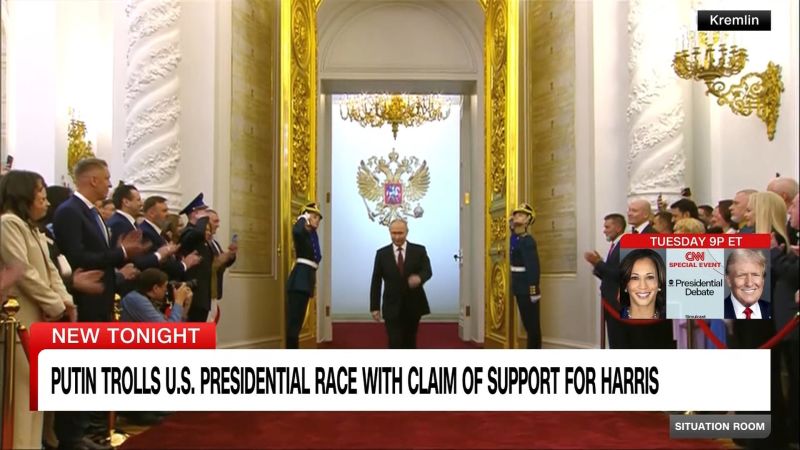In a surprising turn of events, Russian President Vladimir Putin has taken a stance in the U.S. presidential race by expressing his preference for Democratic candidate Kamala Harris. This comes shortly after the U.S. revealed that Russians had secretly paid U.S. content creators and operated fake news sites to interfere in the election process. Putin’s statement adds a new layer of complexity to an already contentious election year, raising concerns about foreign interference in the democratic process. The timing of Putin’s comments is particularly concerning, as they come at a time when tensions between the U.S. and Russia are already high.
Putin’s support for Harris is likely to stir up further controversy in an already polarized political environment. While some may see his endorsement as a boost for Harris, others are likely to view it as a ploy to sow discord and division among American voters. This aligns with Russia’s previous efforts to interfere in U.S. elections by spreading disinformation and creating social media campaigns designed to manipulate public opinion. By publicly stating his preference for a specific candidate, Putin is once again inserting himself into the political landscape of a foreign country.
The revelation of Russian interference in the U.S. presidential race adds a new layer of complexity to an already contentious election year. The U.S. government has been working to combat foreign interference in the electoral process, but Putin’s comments serve as a reminder of the challenges that lie ahead. The use of social media and fake news sites to spread disinformation has become an increasingly common tactic for those seeking to influence political outcomes, and it is imperative that steps are taken to address this threat to democracy.
Putin’s endorsement of Harris raises questions about the extent of Russia’s involvement in the U.S. presidential race and the potential impact it could have on the outcome of the election. While it is unclear what motivated Putin to express his support for Harris, it is likely that his comments will fuel speculation and conspiracy theories about Russian interference in the election. The U.S. government must remain vigilant in monitoring and countering foreign efforts to influence the electoral process to ensure the integrity of the democratic system.
The timing of Putin’s comments is particularly concerning given the already fraught relationship between the U.S. and Russia. Tensions between the two countries have been high in recent years, with disputes over issues such as election interference, cyberattacks, and military interventions in Ukraine and Syria. Putin’s endorsement of Harris could further strain relations between the U.S. and Russia and complicate efforts to address other areas of contention. In light of these developments, it is essential that the U.S. government takes proactive steps to safeguard the electoral process and prevent foreign interference in future elections.
Overall, Putin’s endorsement of Harris in the U.S. presidential race highlights the ongoing challenge of foreign interference in democratic processes. The use of social media and disinformation campaigns to influence public opinion has become a growing concern for governments around the world, and the U.S. is no exception. Putin’s comments serve as a reminder of the need for continued vigilance and cooperation among nations to address this threat and safeguard the integrity of democratic institutions. As the U.S. presidential race moves forward, it will be crucial for authorities to remain vigilant and actively monitor for any signs of foreign interference that could undermine the credibility of the electoral process.


